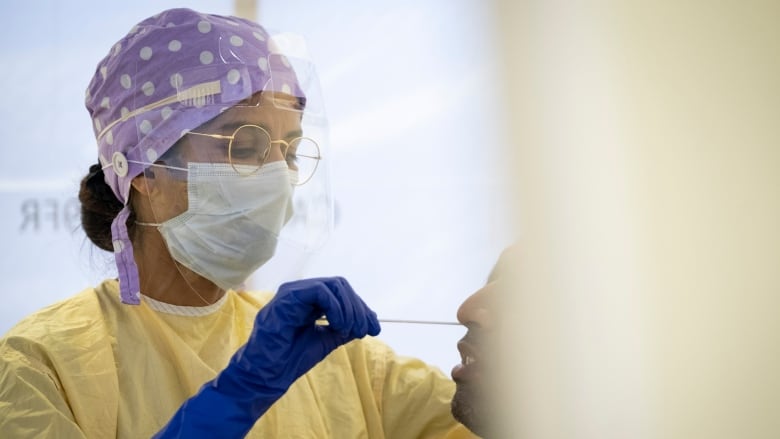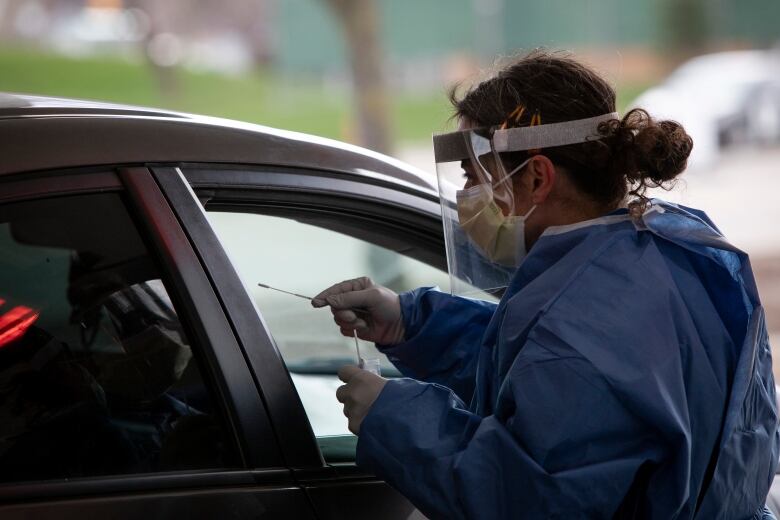Why testing negative for coronavirus isn't a guarantee you don't have COVID-19
False negatives, time when test is taken make testing accuracy more difficult

This is an excerpt fromSecond Opinion, aweeklyroundup of eclectic and under-the-radar health and medical science news emailed to subscribers every Saturday morning.If you haven't subscribed yet, you can do that byclicking here.
Testing negative for the coronavirus doesn't necessarily mean that you don't have COVID-19, the illness caused by the virus, and experts say the high rate of false negatives could mean many cases aren't being caught.
A recent study in the Annals of Internal Medicine from researchers at Johns Hopkins University in Baltimore found the effectiveness of RT-PCR tests, the most common type of test for the coronavirus globally, varies dramatically over the course of COVID-19 infection.
In the first few days before symptoms typically show up, researchers found, the chance of getting a false negative result ranged from 100 per cent on Day 1 to 67 per cent on Day 4.
After symptoms began to show, false negative results fell to 38 per cent on Day 5 and to 20 per cent on Day 8 but rose again everyday after that.
That means at best, COVID-19 patients were found to have a one in five chance of getting a negative test result during their infectioneven if they were actually positive.
"The important takeaway is that we know the false negative rate is very high," said Lauren Kucirka, a resident physician at Johns Hopkinsand a lead author of the study.
"The focus should really be on ruling in positive patients rather than ruling out patients on the basis of the negative tests."
The study does not conclude definitively why the tests have such high rates of false negatives, butKucirkasaid it may be because of the differences in how much virus people shed while infected or because the tests aren't always being done effectively.
She added that if a patient tests negative but doctors still suspect they have COVID-19, either because they were exposed to the virus or have many symptoms of the illness, they should be treated as if they are actually infected.
"We know we're probably going to miss some cases if we use this as the gold standard to diagnose cases because we know it's not perfect," she said.
"It's very important to use clinical judgment and not treat the test as a definitive answer."
Canada could be 'massively underreporting cases'
Canadian physicians on the front lines of the crisis have had to adapt to the reality that tests alone don't tell them whether a patient truly has COVID-19, leaving it up to them to decide on a case-by-case basis.
Dr. Michael Warner, medical director of critical care at Michael Garron Hospital in Toronto, says that even if a test comes back negative, the hospitalwill still consider a patient with COVID-19 symptoms positive in many cases and treat them accordingly.
"There are patients who never swab positive for COVID whom we still think have COVID. There are patients who have died without being swabbed positive for COVID, and we will still write COVID as the cause of death on the death certificate," he said.
"It's clear with COVID when you get a negative test, it could be a false negative, and that's because the test is not 100 per cent sensitive."
The Public Health Agency of Canada (PHAC) said in a statement to CBC News that it is aware of the recent study on false negatives. A false-negative rate of 20 per cent is in line with theexpected performance of the tests, the agency said.

"The timing of testing is critical. The amount of virus or viral load of the person being tested affects the test result," a spokesperson for PHAC said.
"A low viral load, which can occur in the very early stage of the disease or during the recovery phase, could give a false negative result."
Dr. Anna Banerji, an infectious disease expert and faculty lead for Indigenous and refugee health at the University of Toronto, says patients who test negative but are suspected of having COVID-19 should be told by public health officials that they might still have it.
"Anyone with symptoms consistent with COVID should stay at home period even if their test is negative," she said."It's not that you don't have COVID; it's just that the test is not that reliable."
If a person suspects they have COVID-19 despite testing negatives, they should self-isolate,monitor their symptoms and attempt to get re-tested if possible.Banerji says physicians need to diagnose primarily based on both COVID-19 symptoms and risk of exposure to the virusinstead of relying solely onresults of a test.
"It could be negative because it's too early, it could be negative because it's too late, it could be negative because the test wasn't done properly," she said."There are many, many reasons why the test could be negative."
Warner said the high rate of false negatives with coronavirus tests could have huge implications for the accuracy of the number of COVID-19 cases being recorded in Canada. That combined with the cases that may have been missed because patients were never tested means that Canada's case count could be way off, he said.
"I would venture to say that there are many patients in long-term care facilities who died of acute respiratory illness who were never swabbed that are almost certainly COVID-19 related deaths," he said.
Canada has testedmore than two million people for COVID-19, with close to 100,000 people testing positive. Ifa false negative rate of at least 20 per cent were factored in, that could mean more than 25,000 additional cases of COVID-19 that have gone unreported.
"I believe we are massively underreporting cases," Banerji said.
Tests should be reviewed periodically
A recent paper in the New England Journal of Medicine found the accuracy of tests may turn out to be a bigger issue than the availability of tests throughout the course of the pandemic.
"Inaccurate diagnostic tests undermine efforts at containment of the pandemic," researchers at Harvard Medical School in Boston and the Dartmouth Institute in New Hampshire said in the paper.
"If SARS-CoV-2 diagnostic tests were perfect, a positive test would mean that someone carries the virus and a negative test that they do not. With imperfect tests, a negative result means only that a person is less likely to be infected."

The paper called for a review of test accuracy by researchers and regulators in order to better interpret the test results and the implications they have in the pandemic.
Another key concern is the potential for the coronavirus to mutate, which could affect the accuracy of the tests even further in the future.
A new study in the journal Royal Society Open Science by Canadian scientists at York University in Toronto looked at whether tests should be periodically reassessed for compatibility with the virus, because they were developed early in the pandemic and the virus can mutate over time.
"Not all mutations are bad. But these mutations can lead to mismatches with the test," said Kashif Aziz Khan, a research associate at the university and co-author of the study.
"Because these tests that we use to do diagnosis match with specific regions of the viral genome and if that region is mutated eventually there would be a mismatch."
Khan said that could lead to an even greater chance of false negatives.
After examining 27 tests and 17,000 genomes for the virus from around the world, the researchers found seven had potential genetic sequence mismatch issues that could render them less effective or lead to false negative results.
Banerji said she has personally contacted public health officials at all levels of government in Canada to raise her concern about false negatives, because she doesn't think patients who are sick but test negative know they could potentially have COVID-19.
"If someone has a negative test, they don't call them, and nothing really is happening," she said.
"They're being told that they don't have COVID, and that, to me, is very concerning."
To read the entireSecond Opinionnewsletter every Saturday morning, subscribe below or byclicking here.
With files from Lauren Pelley














_(720p).jpg)


 OFFICIAL HD MUSIC VIDEO.jpg)
.jpg)



























































































